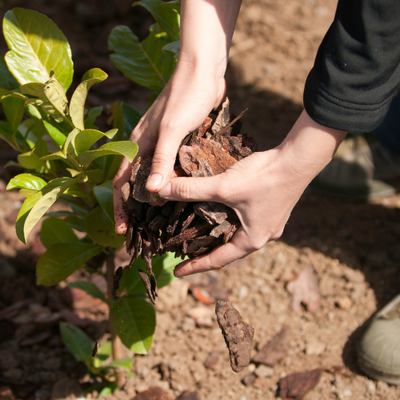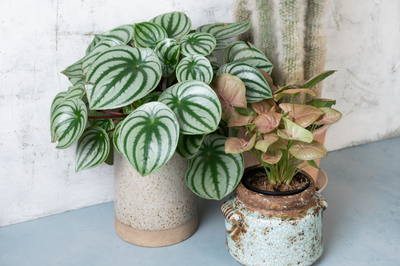
This may sound like a good excuse for some lazy gardening, but actually the principles of ‘No dig gardening’ are being increasingly recognised as highly effective for producing healthy plants and crops, whilst protecting the planet and encouraging a natural balance of friendly microorganisms in our soil and gardens.
We are still learning so much about soil and how it works, as you can read in our other article ‘Working with nature to improve your soil’, we do know that introducing organic matter helps develop a great ‘life-support’ for your plants.
Excessive digging can damage the balance of helpful microorganisms and ‘friendly fungi’ in your soil – these tiny subterranean creatures help release nutrients to your plants and improve the soil structure to allow the right balance of water and air underground.
The old gardening traditions of digging are being replaced by mulching – which is the process of spreading a layer of organic material over the soil surface, this helps the soil and plants by
- Forming a barrier to prevent some weeds from growing.
- Holds water in the soil making it more available to the plant roots, and reducing the need for adding more water.
- Encourage the development of worms and soil based microorganisms
- Gradually breaking down and releasing nutrients / organic material into the soil.
- Stabilises the soil temperature (adding some protection to roots during cold winter weather)
- Possibly deters some pests such as slugs / snails
- Can look really attractive
Examples of some mulching materials Pughs supply
- Bark mulch available as quite large bark chips or ‘nuggets’, smaller mini bark chips, and as ‘composted bark’ (which is less lumpy). Some gardeners like to use a layer, maybe 3 cms deep, of Composted bark on the soil surface and then another layer of larger bark chips on top to give the mulch an attractive and longer lasting finish.
- ‘Blooming Amazing’ – Anaerobic Digestates (known as AD) are a recently developed, highly sustainable, bi-product of the green energy industry. It is made completely from plant materials that have been ‘digested’ in a giant ‘industrial cow’! which produces green energy …and the waste product is then processed and is being used by farmers and gardeners with amazing results. It is rich in nutrients, and makes a wonderful mulch which slugs do not like!
- Composted manure, this manure has been well rotted to stabilise the rich nutrient content. It is perfect for mulching around established plants.
Other materials such as gravels and pebbles can be used as a long lasting mulch, but are less likely to add nutrients to the soil.
If we understand soil as ‘life support’ for our plants, we will see the benefits of protecting and sustaining the soil by using more mulches in our gardens.
We would love to hear about your experiences of mulching and ‘no-dig gardening’ via our social media channels, or in person in our centres in Radyr and Wenvoe, as we continue to learn from each other the best ways to look after our soil.





